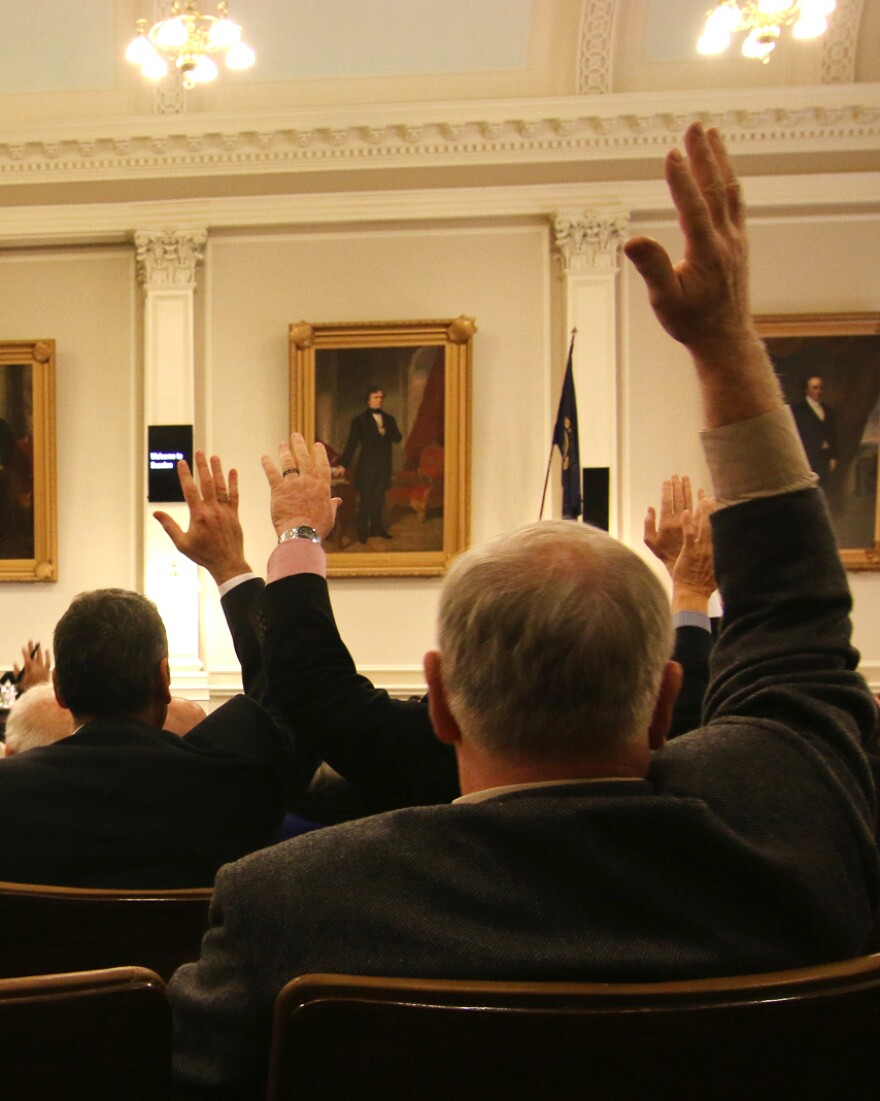For Linda Saunders Paquette and her staff at New Futures, a nearly all-female lobbying team, learning to navigate uncomfortable interactions with legislators in a regular workday at the New Hampshire State House has become almost second nature.

“If we're having a meeting with a particular legislator or even going to a particular event, we use the buddy system,” Saunders Paquette said.
"We go together... Because it becomes known who has a propensity for engaging in inappropriate behavior.”
That “buddy system” strategy might sound like an extreme defense to deploy when meeting with elected officials to discuss legislation. But it’s reflective of what many people who spend their working hours at the State House describe as an environment where young women, in particular, are routinely subjected to casual sexism, comments about their physical appearance and – sometimes – invitations for unsolicited intimacy. (Records provided by the House show that women are not the only targets of this kind of behavior.)
'If we're having a meeting with a particular legislator or even going to a particular event, we use the buddy system...we go together.'
Those interviewed for this story, including current and former lobbyists, legislative staffers and junior lawmakers, say they rarely confront legislators who do cross a line, for fear they might end up paying a price, politically or professionally.
Most people who agreed to speak for this piece requested anonymity for fear that their comments could put their ability to do their jobs in jeopardy.
The incidents they recalled ranged from legislators commenting on the length of women’s hemlines to one lawmaker who cornered a young female lobbyist in the hallway after a vote, grabbed and caressed her arm and whispered in her ear, “You changed my mind.”
Female lobbyists recalled invitations from lawmakers to join them on a boat ride – in their bikinis — or another lawmaker staring at them as though he was “undressing [them] with his eyes.”
And Saunders Paquette said one of her female staffers had recently been invited by a male lawmaker to move their policy discussion away from a professional setting and toward dinner or drinks instead.
“It made that staff person feel very uncomfortable,” Saunders Paquette said. “And it was very inappropriate.”
While no one interviewed for this article described experiencing sexual assault or sustained harassment, they nonetheless described an atmosphere of innuendo and other behavior that would be considered out of line in most other workplaces.

A ‘Cumulative Effect’
Such experiences aren’t limited to those who earn a living in the State House. Female lawmakers said they’ve been on the receiving end of such behavior from their colleagues as well.
Marilinda Garcia, who was first elected to the House at age 23 and left to pursue a campaign for Congress in 2014, said she frequently dealt with “comments on my appearance, comments on my potential personal relationships” and unwanted social invitations from some of her male colleagues during her time in the Legislature.
While Garcia, a Republican, said many of her colleagues treated her with respect, she nonetheless felt “distinctly uncomfortable” in the presence of certain lawmakers because of their inappropriate remarks.
In the few cases where the unwelcome comments from her male colleagues persisted, Garcia said she was “fortunate” to have support from more senior lawmakers who helped put an end to it. Still, those seemingly minor incidents made a lasting impression.
“You kind of just move on and don’t really reflect on these things,” said Garcia, who now works as a lobbyist in Washington. “Now, having done some introspection, you kind of do realize the cumulative effect of these small instances.”
Related story: What We Know About Harassment At The N.H. State House
Garcia also found it hard to shake the sense that she had to adjust how she carried herself in order to be taken more seriously in a largely male-dominated environment. She often wondered whether she was losing out on opportunities to advance legislation or other political goals because she didn’t feel as comfortable building friendships and professional rapport as her male colleagues seemed to.
“Overall, there is a pervasive sense that you do have to feel as though you have to change things about yourself and take precautions and maybe alter things in terms of your sense of friendliness or congeniality or attire, based on different interactions that really ought not to have happened to begin with,” Garcia said.

’Culture of Misogyny’
While New Hampshire has historically been ahead of the curve when it comes to electing women to public office, men still outnumber women two-to-one in the Legislature. Women are in even shorter supply among the current leadership teams in the House and the Senate.
For instance, of the 24 standing committees in the New Hampshire House, 19 are led by men.
Rep. Debra Altschiller, a first-term Democrat from Stratham, says a comment from one of her fellow representatives at new member orientation set the tone for what she describes as a “culture of misogyny” at the State House.
After an announcement about an upcoming “sexual harassment training,” Altschiller recalled, the legislator quipped, “Ha! ‘You think they're going to train us to sexually harass now?’”
“I couldn't believe that this man, who was clearly in his mid-sixties, thought this was a really funny way to engage with two other new members of the House and make a social connection over joking about sexual violence,” Altschiller says.
'When you have a number of people 'just being the way they are' and no one checks them on it, then it becomes really hard to come forward.'
Boosting representation among women might be one step toward creating a less hostile work environment at the State House, but to really change that culture, Altschiller says the institution needs to uphold stricter standards about improper behavior as a part of normal decorum.
“When you have a number of people 'just being the way they are' and no one checks them on it, then it becomes really hard to come forward,” Altschiller says. “Because you've minimized what starts out as uncomfortable behavior and then moves into egregious.”
Lawmakers, Not Employees
Legislative leaders say they do their best to respond to incidents as they’re brought to their attention and try to cultivate a respectful environment for everyone who works at the State House.
“We try to make this a fair and equitable place for people to do their business, for the people’s representatives to come in, for our employees to work and for our lobbying corps to be able to do their work here, and the general public,” says House Chief of Staff Terry Pfaff.
“I don’t want them offended coming in and out of here, either. This should be the shining star of how to conduct yourselves.” At the same time, the State House is a workplace unlike almost any other in New Hampshire for the very reasons Pfaff cited; during its peak business periods, most of the people working there are not, in fact, its employees.
The lawmakers who run the show are elected by the public and, technically, can’t be fired if they misbehave.

There is an independent ethics committee that can field complaints, and House and Senate leadership can take steps to discipline members on a case-by-case basis, but, as recent history has shown, such discipline is rare and almost never results in removal from office.
When former Rep. Robert Fisher was identified earlier this year as the creator of a misogynistic online forum known as “The Red Pill,” for example, House leaders of both parties called for his resignation and formed a committee to investigate his behavior. That committee recommended taking no formal action against Fisher, and he eventually resigned on his own accord.
The Legislature has a formal written policy on sexual harassment and, asks members to acknowledge receiving a copy, but many lawmakers fail - or flat out refuse - to do so.
Just last week, incoming House Speaker Gene Chandler said he has no ability to get lawmakers to take the policy seriously.
“People need to realize members are not employees,” Chandler said. “There’s very little we can do other than try to encourage them to, one, read the policies, and, one, don’t do it — but other than that, they’re elected officials, and there’s little control we have.”
Related story: What We Know About Harassment At The N.H. State House
Staying silent about their experiences comes with its own cost: having to expend extra energy around the State House trying to avoid lawmakers whose words or actions have made them uncomfortable in the past, when they wished they could focus solely on doing their jobs.
The State House sexual harassment policy allows anyone, whether a legislative staffer, a lobbyist, a member of the press or the public, to report cases to House or Senate leadership or to an independent Legislative Ethics Committee.
But New Futures' Saunders Paquette said lobbyists have historically stayed quiet for fear of jeopardizing their chances at passing whatever policies they’re advocating.
“We are very cognizant of not wanting to make anyone angry, should we push back on any inappropriate behavior,” Saunders Paquette said.
“Our policy goals are at risk if we are too strident in our approach. So we take that into account, and it does place us in a very difficult position.”
Other women interviewed for this story echoed those concerns. But they also said staying silent about their experiences comes with its own cost: having to expend extra energy around the State House trying to avoid lawmakers whose words or actions have made them uncomfortable in the past, when they wished they could focus solely on doing their jobs.
“It’s impacted me just by being mindful of who I’m in the hallway with, who I’m in an elevator with, when I’m leaving committee hearings - kind of timing it appropriately as to not be put into a situation that I don’t want to be in,” one female lobbyist said. “It can be exhausting to work over there sometimes, with the amount of diligence you have to have.”
Sending a Message
At New Futures, Saunders Paquette says she doesn’t want her staffers to shoulder that burden on their own any longer. In light of the heightened public conversation around sexual harassment in the workplace, the organization is taking steps to call out what might have been previously written off as the cost of doing business.
“We've come to the conclusion that having personal strategies isn't adequate to address the issue,” Saunders Paquette said.
“We are developing a policy that involves documenting inappropriate behavior by legislators or others that work at the State House, understanding that if something inappropriate happens, management at New Futures needs to hear about it, and then of course we need to access the process available at the State House and also through the Legislative Ethics Committee, if need be.”
The hope is to send a message that such incidents should not be considered part of the norm and will lead to a healthier work environment.
If nothing else, Garcia and others interviewed for this story hoped that speaking up about their experiences might help people to understand how these incidents, if left unchecked, can interfere with people’s ability to work effectively.
“I know so many men personally and professionally that have been just golden examples of respect and equality and collegiality,”Garcia said.
"If this nationwide examination we’re doing helps them be promoted and the other ones to fall by the wayside or bring everyone to that level of professionalism and respect and equality, I think that’s a great thing.”








